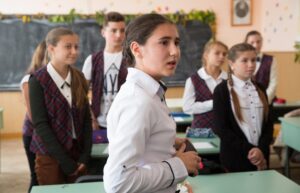Throughout the last few years, the School has shown a desire to transform itself to meet the needs of the students. The ministerial directives underline the importance of the fight against school failure and highlight the interest that parents and teachers have in taking up this challenge together. Thus, at the start of the new school year, books designed for parents are distributed in primary schools. In order to create favorable conditions for student success, the school “counts on the competence and dedication of teachers, but also on the commitment of parents” (MEN, 2008, p. 4). These documents also specify that the latter have “a decisive role to play” and that they must be “associated” with the changes underway. Gayet goes in the same direction when he declares on this subject: “Indisputably, it is on the convergence between the educational styles of the family and those of the teacher that the academic success of the child will essentially depend” ( 1999, p.50). The political objective is to unite around the child all the educational actors of his close environment in order to offer him the means to develop his resources in an optimal way. The procedures that the teacher will use to strengthen this communication contribute to the quality of the relationship that is established between the school and the family. Calabuig and Tovar echo this approach to the question by confirming that, within the framework of “a shared educational responsibility”,
2. The school media are precisely these tools for transmitting information. In current scientific literature, these media mainly refer to written materials. Homework, the school newspaper and newsletters are the main examples (Humbeeck, Lahaye, Balsamo & Pourtois, 2007, p. 16). However, neither the understanding of how to use the information thus collected on the child’s activity, nor the remedial procedures to be implemented in the event of difficulty are not self-evident.
3. Among the pedagogical practices likely to establish links between the family and the school, the completion of homework remains particularly problematic. Some of this work, for elementary school pupils, has been officially prohibited since 1956. It is therefore important to pay particular attention to the way in which the teacher’s project meets parental educational intentions. Indeed, the constraints generated by the moments of intrusion of school tasks at home – in strict compliance with the regulations in force – induce several types of reactions. While some parents appreciate this evening work and declare that they take pleasure in doing it, it is also common to note that this interference of the school in the private sphere is likely to become a real source of daily hassle. Rayou also believes that currently, “the ordinary way of considering the circulation of work between class and out-of-class is not necessarily the most adequate” (2009, p. 165).
4. These findings indicate that if the school is concerned with encouraging the involvement of parents, it must create the conditions for them to feel the desire to invest in the education of their child, and ensure that everyone finds the means to succeed in his intervention. Indeed, the space in which homework is done, that of the family, is a space already charged with emotions. As we know, contemporary families have to face many daily constaints, in addition to those related to the schooling of children.
5. Taking all this data into account offers broad research perspectives; they consist, within the framework of the present study, in determining to what extent the personal work that the child must do outside the classroom can sometimes represent a source of hassle for the parents, sometimes a moment for the family to participate in the project. school training. Simonato (2007, p. 29) for example asserts that “too many implicit misunderstandings persist, fostering resentments that deteriorate the teacher/parent relationship”.
6. In many ways, expectations of families are contradictory. Belmont regrets that they are “little informed about the functioning of the school, its implicit rules of the game, the teachers’ expectations” (1999). The main obstacle to the implementation of the project that the educational institution conceives for their destination lies indeed in the fact that, if the intentions of the school reflect rich and ambitious educational perspectives, the actions which aim to materialize are more complex to manage in the field. Also Dupuis and Prairat deplore that we “regret the indifference of certain families, and that, at the same time, we fear more than anything their entry into the School” (2000, p. 7). Several studies thus highlight the daily difficulties to which parents who wish to contribute to the actions implemented within the school are exposed. Glasman, for example, notices that the expectations to which they are subjected contradict each other: while soliciting them and trying to convince them that their participation has a decisive impact on the child’s academic success, their ability to act in a way that is adapted to the requirements of the school is often denounced. In other words, their involvement in the pupil’s




